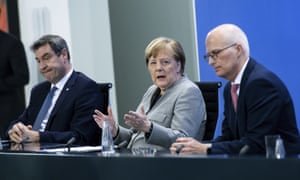Merkel announces plans to reopen schools and shops in Germany

Conservative politicians vying for the leadership of Angela Merkel’s party argued over a timetable to exit the nationwide lockdown as the German chancellor announced plans to partially reopen schools and shops in the coming weeks.
Hailing latest figures indicating a slowing down of the infection rate as a “fragile intermediate success”, Merkel said on Wednesday evening that teaching at schools across the country would start again from 4 May, initially for students in their final years of primary or secondary school.
Hairdressing salons will also be allowed to reopen on 4 May if they take special steps to guarantee customers’ hygiene. Shops of up to 800 square metres in size, as well as bookshops, bike stores and car dealerships, will open again from this coming Monday.
Social distancing measures will remain in place until 3 May and large cultural events, such as concerts and beer festivals, will remain banned until the end of August.
Merkel “urgently recommended” people to wear protective masks on public transport and while shopping, but stopped short of making them mandatory. “We have achieved something that wasn’t guaranteed,” the chancellor said. “Our health system has kept running”.
However, under Germany’s federalised system the closure and reopening of schools and nurseries falls under the jurisdiction of the states or Länder, meaning any concerted exit strategy envisioned by Merkel requires a consensus among the 16 state premiers, which has been hard to achieve.
Merkel stepped out in front of the cameras to make her announcement an hour and a half late following a video conference that reportedly involved clashes between the most powerful state premiers. Disagreements over the timetable for an exit route out of the lockdown have cut across German party line in unexpected ways.
Until the crisis rewired the dynamics of German politics, Armin Laschet, the state premier of North-Rhine Westphalia, was seen as the frontrunner in a trio of male politicians vying to take over the leadership of Merkel’s Christian Democratic Union, and the closest option there was to a continuity candidate.
But in the heated discussion over the timetable for relaxing the current restrictions on social movement, Laschet has at times found himself at odds with the chancellor whose decisions he loyally defended at the peak of the 2015 refugee crisis.
On Tuesday this week German media reported that North-Rhine Westphalia was intending to start reopening schools as soon as next week, after the end of the Easter holidays – a unilateral move that put him at odds with the head of government. “Armin Laschet, the barger”, ran a headline in the Stuttgarter Zeitung newspaper.
Merkel appeared to hint at her opposition to Laschet’s stance on Wednesday when she warned against “rushing ahead” to end the lockdown.
Laschet has also been accused of trying to rush researchers into providing the scientific data to support his call for a speedy path out of the lockdown. A pioneering case study Laschet helped to commission of the Covid-19 outbreak in Heinsberg, a municipality on the Dutch border that has been described as “Germany’s Wuhan”, has gained much media attention but scientists question whether its findings can already be applied to the rest of the country.
For the conservative premier of Bavaria, Markus Söder, the pandemic has boosted his national profile. The leader of the Christian Social Union, sister party to the CDU, is not officially in the running to fill the soon to be vacant seat at the top of Germany’s biggest political party, but his leadership has given him a reach that is historically unusual for politicians from Germany’s southernmost state, whose strong cultural identity and Catholic roots can make its public figures less relatable further north.
As others dithered over lockdown measures, Söder took decisive steps to close down schools, bars and restaurants that the rest of the country eventually followed. One subsequent popularity ranking had the 53-year-old overtaking Merkel, making him Germany’s most popular politician for the first time.
In a statement on Wednesday Söder was keen to remind the public of his achievements, noting that while Germany had coped with the pandemic better than other states across the world, “we should not forget that things could have been different if we have acted wrongly or too slowly”.
The two remaining candidates aspiring to lead the CDU, the veteran rightwinger Friedrich Merz and the foreign policy expert Norbert Röttgen, have meanwhile struggled to build a profile as neither of them hold executive positions. Merz, who is popular with large parts of the membership, announced that he had been infected with Covid-19 on 17 March, but has reportedly since recovered.
Follow us on twitter (ajuede.com) or on Instagram (ajuedeman) for details of the global situation presently.




.jpeg)

Comments
Post a Comment